简明商务英语口译教程Unit 7[精]
- 格式:ppt
- 大小:723.00 KB
- 文档页数:22
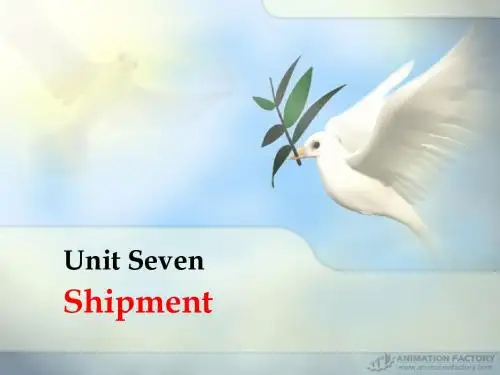
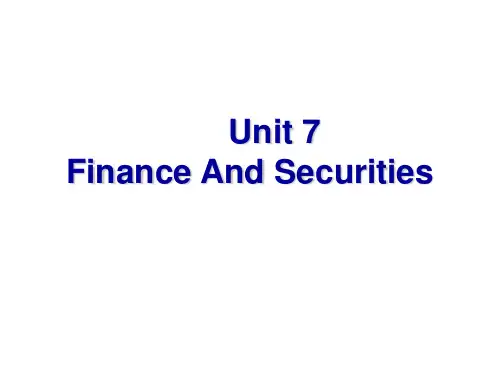
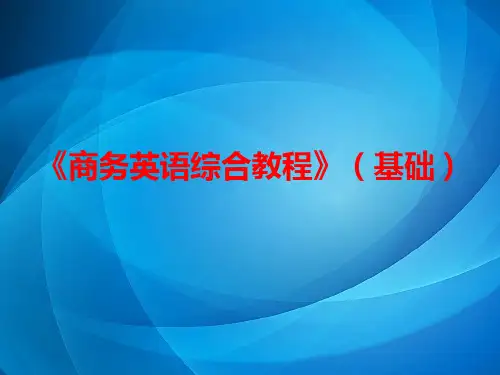
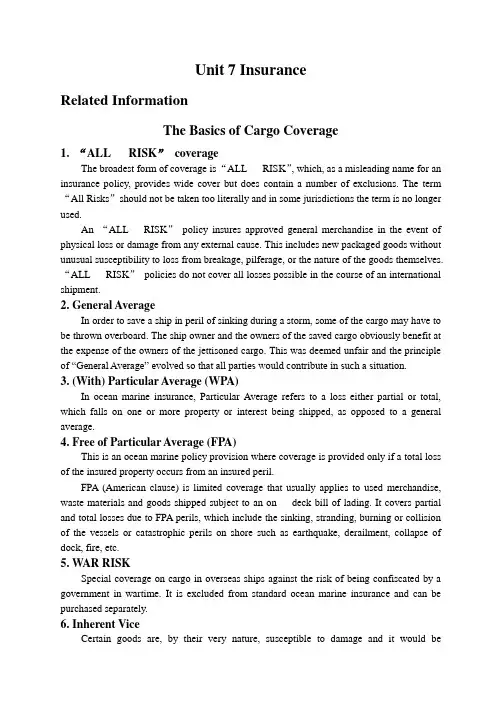
Unit 7 InsuranceRelated InformationThe Basics of Cargo Coverage1. “ALL RISK”coverageThe broadest form of coverage is “ALL RISK”, which, as a misleading name for an insurance policy, provides wide cover but does contain a number of exclusions. The term “All Risks”should not be taken too literally and in some jurisdictions the term is no longer used.An “ALL RISK”policy insures approved general merchandise in the event of physical loss or damage from any external cause. This includes new packaged goods without unusual susceptibility to loss from breakage, pilferage, or the nature of the goods themselves. “ALL RISK”policies do not cover all losses possible in the course of an international shipment.2. General AverageIn order to save a ship in peril of sinking during a storm, some of the cargo may have to be thrown overboard. The ship owner and the owners of the saved cargo obviously benefit at the expense of the owners of the jettisoned cargo. This was deemed unfair and the principle of “General Average” evolved so that all parties would contribute in such a situation.3. (With) Particular Average (WPA)In ocean marine insurance, Particular Average refers to a loss either partial or total, which falls on one or more property or interest being shipped, as opposed to a general average.4. Free of Particular Average (FPA)This is an ocean marine policy provision where coverage is provided only if a total loss of the insured property occurs from an insured peril.FPA (American clause) is limited coverage that usually applies to used merchandise, waste materials and goods shipped subject to an on deck bill of lading. It covers partial and total losses due to FPA perils, which include the sinking, stranding, burning or collision of the vessels or catastrophic perils on shore such as earthquake, derailment, collapse of dock, fire, etc.5. WAR RISKSpecial coverage on cargo in overseas ships against the risk of being confiscated by a government in wartime. It is excluded from standard ocean marine insurance and can be purchased separately.6. Inherent ViceCertain goods are, by their very nature, susceptible to damage and it would beunreasonable to expect insurers to pay for such damage. Examples of Inherent Vice are deterioration of Perishable Goods, spontaneous fermentation or combustion of improperly dried grain.7. WAREHOUSE TO WAREHOUSE protectionMost cargo insurance protects goods in transit from the time they leave the shipper’s warehouse until they reach the consignee’s warehouse, as long as they are not taken out of the normal course of transit by the insured.Lead-in1. Listening1. D2. BTape Script:Tim is talking to Judd about the insurance of a product order.Tim: Good morning, this is Tim. Is that Judd?Judd: Yes, this is Judd speaking.Tim: I’m calling to discuss the insurance coverage you requested for your order.Judd: Good, we requested an amount thirty percent above the invoice value.Tim: We have no problem complying with your request, but we think that the amount is a bit excessive. You know according to our usual practice,we insure the goods only for 10% above the invoice value.Judd: Yeah, but in the past, we’ve really been put in a bind because of damaged goods. Tim: I understand your concern. However, usual coverage for goods of this type is the total invoice amount plus only ten percent.Judd: We could feel more comfortable, though, with thirty percent.Tim: Unfortunately, if you want the increase in coverage, the extra premium will be for your account.Judd: But shouldn’t your quotation include adequate coverage against risks?Tim: That quotation involved normal coverage, but not all. So I suggest you contact your insurance agent there and compare rates.Judd: OK. Thanks. I’ll check it out.2. Spot DictationPart 1 1. T 2. T 3. F 4. F 5.FPart 2 1.practice 2. insurance 3. insure4. the People’s Insurance Company of China5. premium6. covered Tape Script:Sophia: According to our usual practice, we do business with our customers on a CIF basis, Mr. Smith.Smith: That’ s good . It will save us a lot of time because we don’t need to deal with so many insurance formalities. But I’d like to know how much the premium is .Sophia: Well, Mr. Smith, it will vary according to the types of risks to be covered.Smith: I see. Which company do you usually insure with?Sophia: We always insure our goods with the People’s Insurance Company of China. Smith: That’s great. May I ask what insurance you will cover according to your usual CIF terms for these glassware?Sophia: We usually insure against All Risks for glassware.Smith: Including War Risk?Sophia: No, War Risk is a special additional risk and it has to be arranged separately.Generally speaking, it is not necessary to insure against that risk ,as All Risks has provided enough protection to your order.Smith: I see. Thank you for your information.Text ALanguage Study1. insurance①n.the contract made by a company or society, or by the state to provide a guaranteeof compensation for loss, damage, sickness, death, etc in return for regular payment 保险◆People without insurance had to pay for their own repairs.arrange/cover/ effect / provide/ take out + insurance 办理保险◆Under FOB terms, insurance is to be covered by the buyer.insurance company 保险公司insurance policy 保险单insurance certificate 保险凭证insurance premium 保险费insurance value/ amount 保险金额insurance agent 保险代理人②insure vt.make a contract that promises to pay sb an amount of money in case ofaccident, injury death, etc, or damage to or loss of sth 保险,投保◆Every company would insure itself against loss or damage to its property.insurer n.承保人the insured n. 被保险人2. As a large percentage of our foreign trade in and out of this country goes by ship, what mainly concerns us is still the marine Insurance.此句中what mainly concerns us 是主语从句,所以后面的谓语动词用单数。
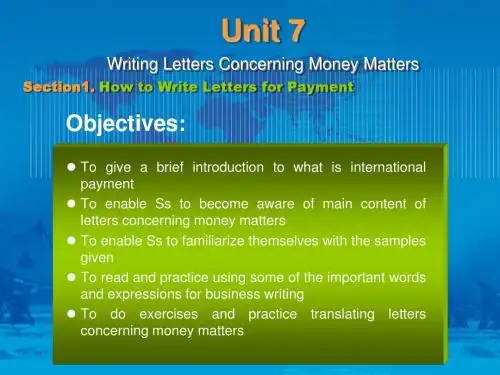
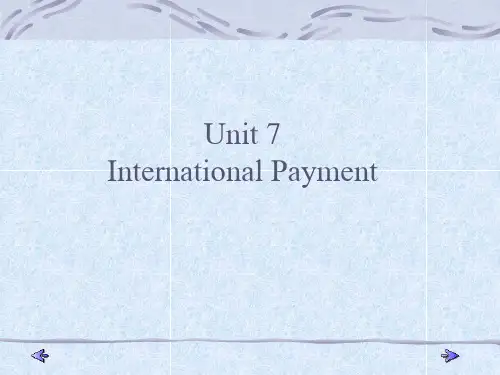
![简明商务英语口译教程Unit 9[精]](https://uimg.taocdn.com/414a3f3616fc700abb68fca0.webp)


![简明商务英语口译教程Unit 1[精]](https://uimg.taocdn.com/f4c69565ba1aa8114431d978.webp)
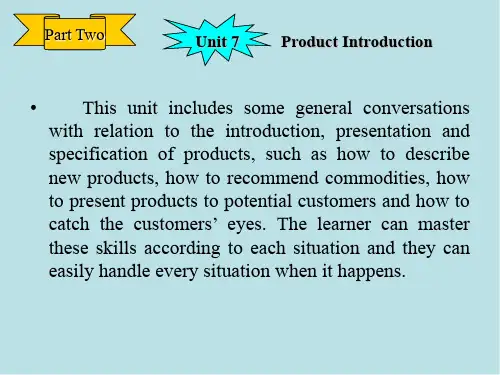
第七单元服务行业TEXT A 服务行业与服务管理我们现在正处于一个服务的时代,并且服务已经逐渐处于社会的中心地位。
在美国,各种各样的服务占据了美国就业市场的80%,服务行业已经创造了GNP的74%,占经济活动的55%,这些都远远把制造业抛在了后面。
其它发达国家也在过去的20年内同样也经历了这样一个趋势。
因此我们必须首先弄懂,“什么叫服务?〞我们通常把服务叫做由个人或团体为获益他人而做的工作。
我们的经济结构和贸易理念一起在改变,而这种改变最终导致由产品为中心转移到以服务为中心,被称为“第二次革命〞和“信息社会的开端〞。
那什么叫服务行业呢?当政府官员或经济学家提到服务行业,他们总会定义其为“创造不可见产品的行业。
〞服务行业分为以下几个部分。
运输服务、邮递服务和仓储服务信息服务股票证券服务和其它金融投资服务租赁服务职业、科技服务行政服务、废物回收服务和维修服务健康保健服务与社会援助服务艺术、娱乐、休闲服务其它服务从上面的分类我们可以看出,现今服务已经渗透到我们生活的各个角落。
不言而喻服务在我们的日常生活与商务活动中扮演越来越重要的角色。
然而并不是所有人与公司或组织会意识到服务的重要性。
许多经理像鸵鸟一样只是把它们的头深埋在沙子里,许多人袖着手违心地说,“服务大潮只不过像一阵风罢了,不是吗?〞当然,从另一方面,也有许多工作人善于服务,请看下面的案例。
Stew Leonard 经营着一家利润丰厚的三层楼的商店。
他说每当他看到一个愠怒的顾客就如同看到5万美元飞出了他的商店。
为什么呢?因为,像这种一般的顾客每个星期花100美元,一年有50周要购物,然后呆在这个地方可能大约10年。
如果这样的一个顾客在商店有一次不愉快的经历而反而转身另外一家商店的话,那Stew Leonard商店就会少5万美元的收入。
如果这个不满意的顾客把他的不愉快的经历告诉其他顾客,让他们也离开的话,那损失将会更大。
为了挽回顾客,Stew Leonard商店创造了被《纽约时报》称为“商店中的迪斯尼乐园〞,设有化妆的卡通人物、定期的娱乐项目、宠物乐园与电子动物。